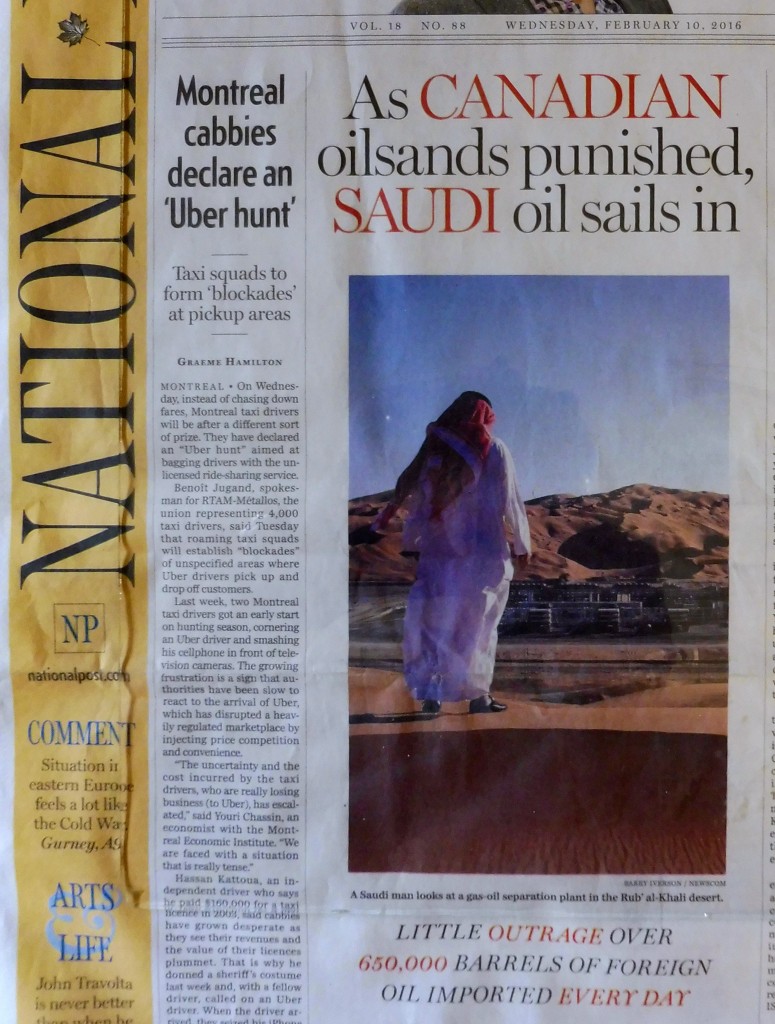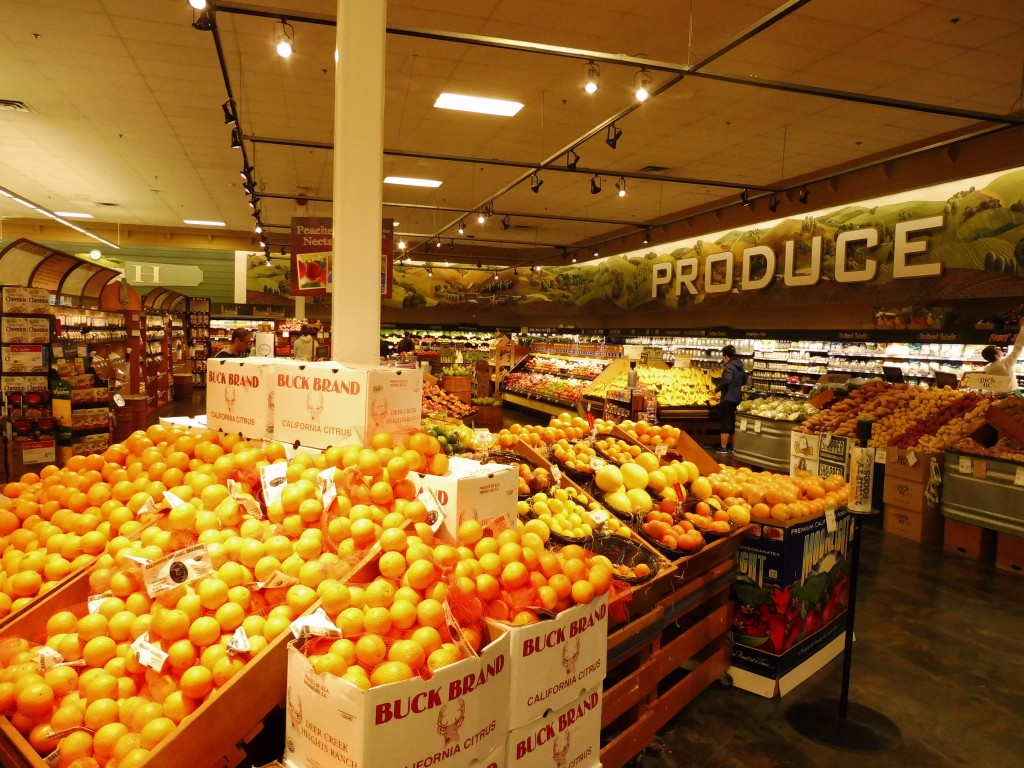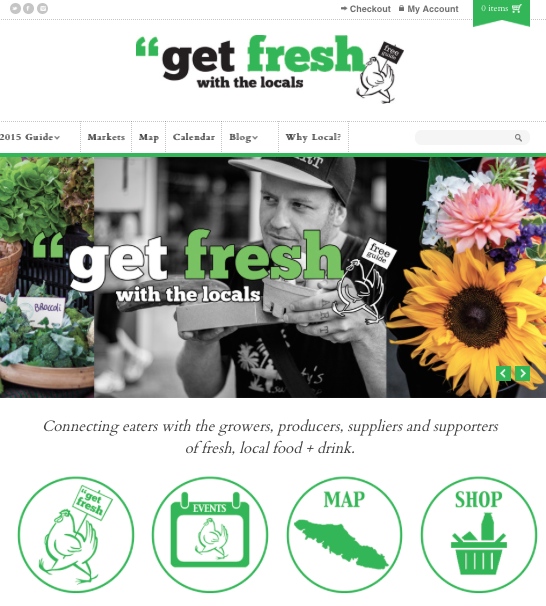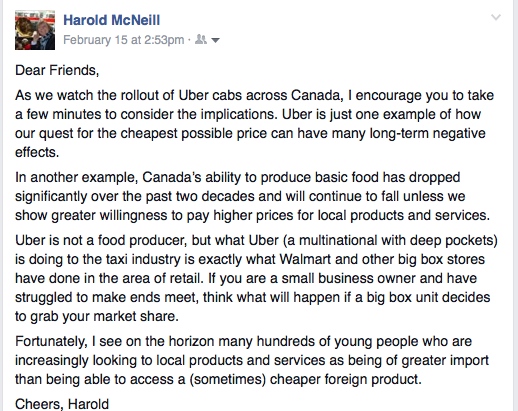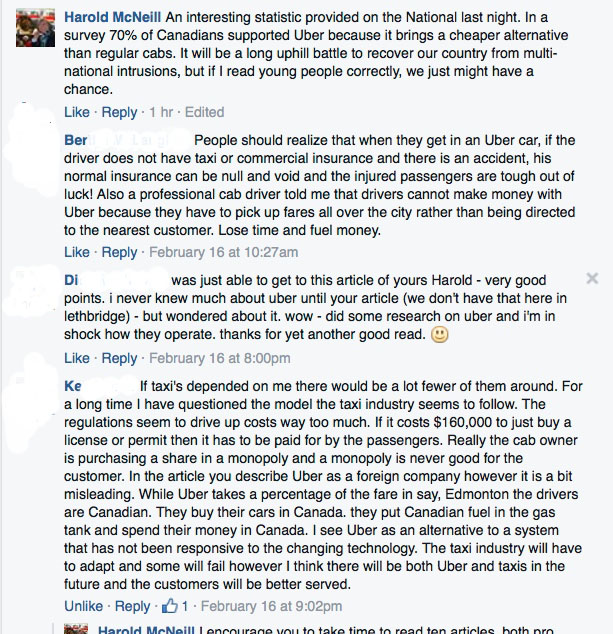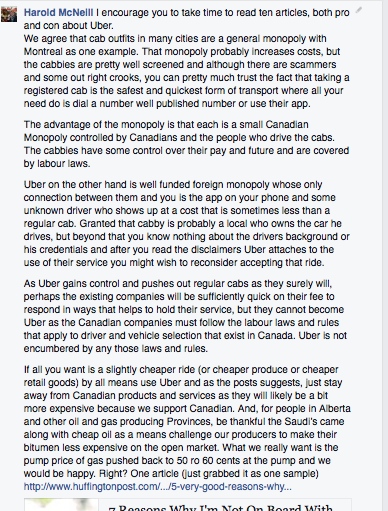Uber Taxi Good, Saudi Oil Bad?
National Post, February 10, 2016
(A quote modified from another source: “Montreal cabbies may be a monopoly, but at least they’re our monopoly.”)
An interesting contrast of ideologies was presented on the front page of NP on Wednesday as one headline decried the actions of Montreal Cabbies as they sought to protect their jobs from the unregulated, undercutting Uber system and the other whined about cheap Saudi oil forcing depressed prices in the world markets which, the article suggested, hurt Canadian production and cost oil patch jobs. First to the cabbies. (Note: Comments added in footer)
Many independent cab owners in Montreal paid upwards of $160,000 plus yearly fees to buy into the highly regulated Montreal Taxi System. Of course, a fire fight was ignited when the largely self-regulated, US based, multinational 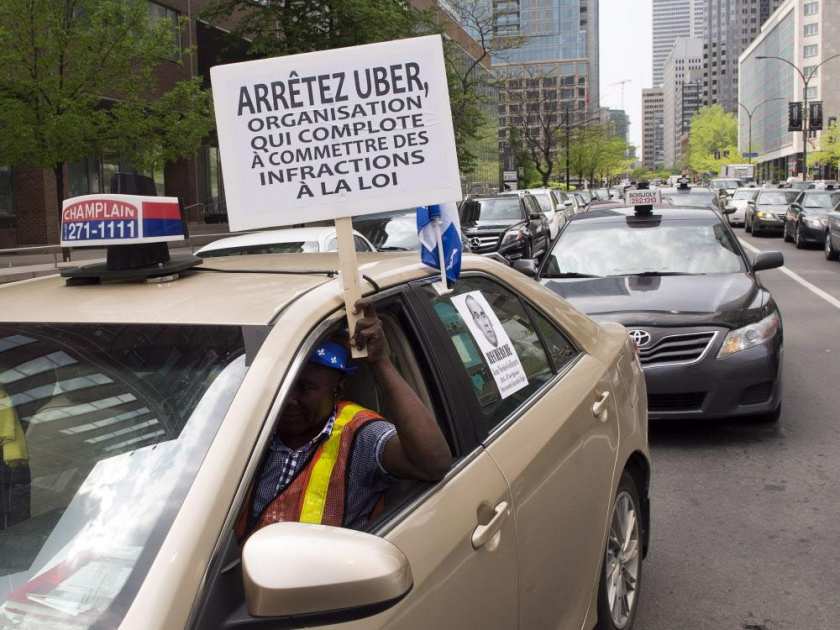 Uber recently began service in the city. Uber is not subject to any of the rules that apply to MTL set by the Province, City of Montreal and drivers representatives. While Uber does conduct online screening of drivers and vehicles, their largely superficial online system provides the company with a huge market advantage.
Uber recently began service in the city. Uber is not subject to any of the rules that apply to MTL set by the Province, City of Montreal and drivers representatives. While Uber does conduct online screening of drivers and vehicles, their largely superficial online system provides the company with a huge market advantage.
To compare the two, I began the online registration to become an Uber driver, but because my vehicle is older than the 2006 limit (note, Montreal Cabs can be no older than three years) I did not qualify to join. However, had my vehicle been within the limits, it is likely that by today I would qualify to become an Uber driver in the Victoria area. The process is simple compared to the intensive screening, training and expense incurred before a Montreal cabby hits the street.
Worse for everyone, Uber is not required to pay any local, provincial or Federal taxes. In one NP article, Graeme Hamilton, a financial reporter, goes on to boost the Uber system as one “which has generally disrupted a heavily regulated marketplace by injecting price competition and convenience.” (Link to one of several articles)
Acquaintances and friends who have used Uber while travelling in cities across the US, gave the company two thumbs up. One commented: “It is simple to order an Uber cab, it provides timely arrivals, costs far less than a normal cab, the vehicles are clean and the drivers know cities in which they work.” The same Uber users objected to the regular cab system stating among other downsides, that many drivers do not know their city and must rely upon a GPS to get to the requested destination.
Now switch to the other story on the same from page. The article includes a large photo (posted above) of a Saudi man gazing out and over a gas-oil separation plant in the Rub’ al-Khaki desert. The article carries the bold headline: “As CANADIAN oil sands punished , SAUDI oil sails in.” The implication of that headline and photo is made clear as the article continues:
“… Saudi imports alone are the equivalent to the daily production of a mid-sized producer such as Calgary-based Penn West Exploration Ltd., one of scores of Canadian Companies that are struggling to remain solvent. No one seems to be questioning the climate cost of foreign crude.”
Stop already! I get it, I get it! Cheap Uber taxis coming to Canada is good even if it kills hundreds, no thousands of Canadian taxi jobs, but cheap Saudi oil is bad for Canada, because it kills hundreds, no thousands of Canadian oil field jobs? Well you can’t have it both ways folks. We either support Canadians and their jobs or we support foreign business interests who bring in cheaper products and services whether it be Saudi oil, Uber taxi’s along with California and Mexican fruits and vegetables.
If a foreign business interest is able to control the market by cutting prices and pushing Canadian services, manufactures producers out of business, well that is just good business is it not? That not exactly what the Saudi’s are doing the oil industry, Uber is doing in the area of transport and what Walmart, big box stores and multinational on-line marketing groups have done and are doing in the retail industry. Let the big guys kill the little guys and prices will go down. Right?
Don’t mistake my position – I support Canadian workers in every field from the oil patch to a farmers field and think that as a people we often hurt our long term interests when we choose to save a dollar rather than trying to help a local business or farmer survive. Perhaps you are one of those people who occasionally complain about the high price of gas at the pump? Have you watched gas pump prices plummet since the Saudi’s started dumping their oil? I bet you were delighted the last time you filled your tank.
Over the past decade government controls in many areas have been reduced (e.g. demise of the Canadian Wheat Board). Over time, hundreds of Canadian jobs have been exported to the US and other countries where labour laws are more relaxed (or non-existent) and labour is cheap. Hence products (and produce) costs far less. You know, all know of countries were cheap labour is the norm.
When Canadian businesses (where workers receive better pay and benefits) are forced out of the market, costs will rise. This is what Uber does in markets they control and where it only takes the flip of an app switch in San Francisco to change the cost of a ride in Montreal when demand is high. Another downside of companies like Uber is that drivers (they are called contractors) are employed at the leisure of Uber and Canadian, Provincial and local labour laws do not apply. The company can do exactly as they wish including flipping off a contractors switch without giving notice or a reason. Any form of worker rights have been relegated to third world status.
Take a few moments and fill out an application to become an Uber driver. There is no obligation to take the job. It is all done on-line and while there are promises of good pay and independence, I expect the pay and benefits will be largely illusionary as the company gains a greater market share and can accept and dismiss drivers simply by creating or deleting an online account. There is no recourse for contractors as Uber is nothing more than an online game in which real people and real cars are linked by an online Uber controlled account.
Now back to …
Self Sufficient in Canada
February 13, 2016. The Thrifty Foods Produce Department at Broadmead in Victoria, B.C. is filled to capacity with all manner of fruits and vegetables. How many of these items is locally produced? If you guessed “hardly any” you would be pretty close, in fact the potato bin near the front with a few other vegetables is about the only B.C. (or Canadian) produce you will see. But, that’s not all Thrifty’s fault.
At one time Canadians were fairly vegetable self-sufficient, but that is no more. We are now almost entirely dependant on produce from other countries, mostly California and Mexico, as appear in the displays at Thrifty’s. Every year more Canadian growers fold their tents as they cannot compete against producers where either labour laws have yet to be written or where high yield production methods and cheap labour means everything 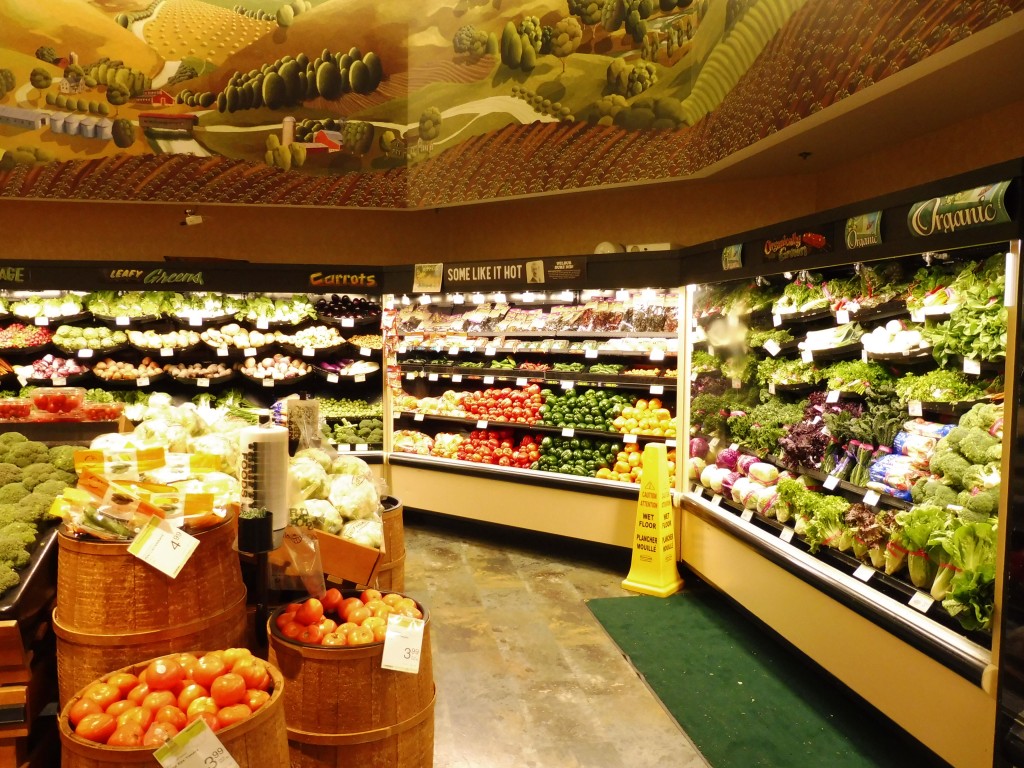 and nutrition means nothing.
and nutrition means nothing.
As more Canadian producers are forced out because of cheap imports, those imports have become our only choice. Of course, that being the case price will jump as has happened in recent months with many vegetables and just as happens after Uber controls a market and local suppliers are pushed out.
Think for a few minutes about your own work and income if it was totally managed under the rules of an offshore company or by an online app over which a nameless authority pulled all the strings and was not subject to any Canadian laws?
If all we want is ‘more’ and ‘cheaper’ then we need to stop whining about losing Canadian jobs and businesses and stop being concerned about the application of labour laws. Instead, we need to encourage our oil workers, taxi drivers and others who become unemployed due to price cutting, to simply settle for less by working at MacDonald’s, Tim Hortons, Starbucks or any of the big box stores such as Walmart where starvation wages are paid and worker benefits held to a minimum because a good percentage of line workers in those businesses are currently TFWs.
As for the National Post articles, just because it’s an oil field job in Alberta, Saskatchewan or Newfoundland that is affected by cheap Saudi oil, doesn’t make it more important than a taxi job in Montreal, Edmonton or Vancouver. All jobs that employ Canadians, that pay a living wage and provide defined benefits and safe working conditions, helps all other Canadian as we share in building and equitable society. While the fix is not simple, Canadians (that means you and me) need to pay more attention when making that next purchase and, whenever possible, select and buy Canadian products and produce.
If you can’t get a fresh cob of corn until it comes into season in Canada, well just wait a couple of months in anticipation of that special treat when the local corn appears on market shelves and at roadside stands. If you choose instead to sate yourself with cheap California corn for two or three months in the spring, don’t be mystified when Canadian corn growers go out of business. As suggested in the following guide, make a healthy choice for ourselves, for our economy and for our workers and Get Fresh with the locals. Do the same the next time you need to grab a taxi.
Cheers,
Harold
Facebook Comment Flow
Comments Part 2
Comments Part 3
Response
(334)
Trackback from your site.

